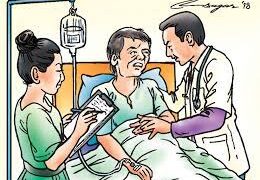By Ebi Kesiena
In response to a significant spike in cholera cases, the Zimbabwean government has initiated strict measures, including the limitation of public gatherings and the regulation of food vendors. The country has also intensified surveillance of burials in all areas affected by the outbreak.
Cholera cases in the southern African nation have surged dramatically this week, tripling from 437 to 1,259. This marks the most substantial increase since the onset of the water-borne disease in February, causing heightened anxiety in Zimbabwe, where over 4,000 people succumbed to cholera in 2008.
As of the latest update from the health ministry, Zimbabwe has reported 155 deaths linked to cholera out of 8,787 confirmed cases, while authorities declared a state of emergency in the capital, Harare, where the highest number of new infections has been recorded.
On Friday, residents in Harare’s low-income Kuwadzana suburb, accounting for seven of the capital’s 13 cholera-related deaths, voiced their grievances as they cited irregularities in clean water supply, uncollected garbage, and the presence of raw sewage in the streets.
Many residents have dug shallow wells to meet their household water needs.
“The water from the boreholes has also become contaminated. They are encouraging us to treat the water before drinking and to come to the hospital if we feel sick,” Bertha Rwizi said as she received treatment at Kuwadzana polyclinic, where the authorities have set up three emergency cholera treatment tents.
Also, Health worker Mercy Chiweshe said clean water was key to treating cholera cases as well as preventing further infections.
“We are appealing for boreholes because the shortage of water is affecting us and for residents to maintain good hygiene,” she said.
However, as part of the concerted efforts to combat the diarrheal disease, Harare’s municipal authorities have been distributing water treatment tablets to residents. These measures aim to mitigate the impact of the cholera outbreak and safeguard public health in the affected regions.




































